3 PROTEIN POWDER SCAMS TO AVOID (WATCH OUT!)
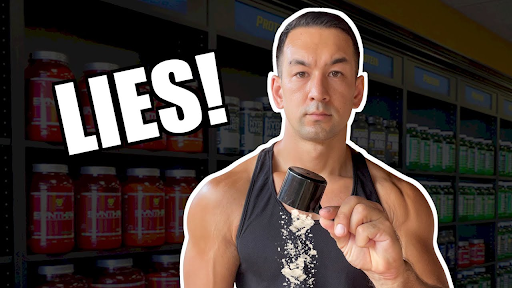
Protein Powder Scams: Scheming You Out of Gains?
Protein powder is probably one of the most popular products sold by pretty much all supplement companies.
With that kind of high demand, protein powder costs are consistently increasing from year to year. On top of that, a pretty high percentage of supplement companies are generally shady when it comes to their business practices. For you, their customer, this can lead to problems that hurt both your wallet and brain from all the trouble.
This article aims to help with that. There are a few really important things you need to watch out for when you’re purchasing a protein supplement.
Companies frequently will use 3 misleading tactics in particular, mostly in terms of over-hyping their powders and driving down manufacturing costs. This means that you ultimately end up paying more for a lower quality product.
So, if you want to make sure you’re getting the very most bang for your buck from your protein powder, so that you can build muscle and lose fat effectively while saving money, then you’ll want to stick around. I can almost guarantee that there’s probably at least one thing in here that you had probably had no idea about.
Let’s begin:
Protein Powder Scam #1: Amino Spiking
This one is a “greasy” little trick known as amino spiking. To better understand what this is, let’s first talk about the protein powder manufacturing process.
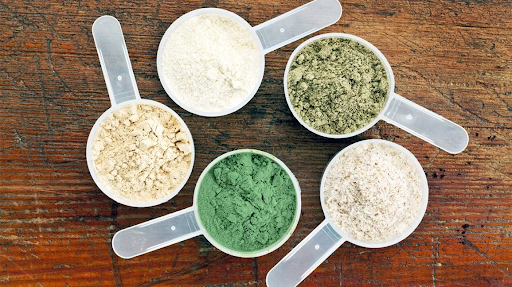
It’s important to understand that when protein powders are tested to analyze how many grams of protein they contain per serving, the total amount is not based on how much complete protein it contains. Instead, it is based on the total nitrogen content of the powder.
This opens up a labeling loophole that supplement companies can take advantage of. You see, singular amino acids (which are the building blocks of protein and contain nitrogen) can be added into the powder separately to artificially raise the protein gram number on the label.
Essentially, some companies put in a certain amount of legitimate complete protein, but then inflate that protein count further by dumping in singular, free-form amino acids on top. Of course, they use the absolute cheapest ones so that they can save on costs.
Examples of Amino Spiking:
Maybe your protein powder lists 25 grams of protein per scoop on the label. But when you take a closer look, in reality it’s only 15 grams of actual protein. After that, it’s 10 grams of one or two cheap, low quality amino acids. In turn, these aren’t giving you any added muscle building effect.
The company you bought from makes more profit on each tub, and you get a lower quality, less effective product.
Fortunately, amino spiking isn’t nearly as common as it was a few years ago as more and more consumers have caught on. However, there are still quite a few protein powders out there doing this, so it’s something you should be aware of.
But how do you know if your protein powder is amino spiked? It’s actually pretty simple: you need to look at the ingredient label.
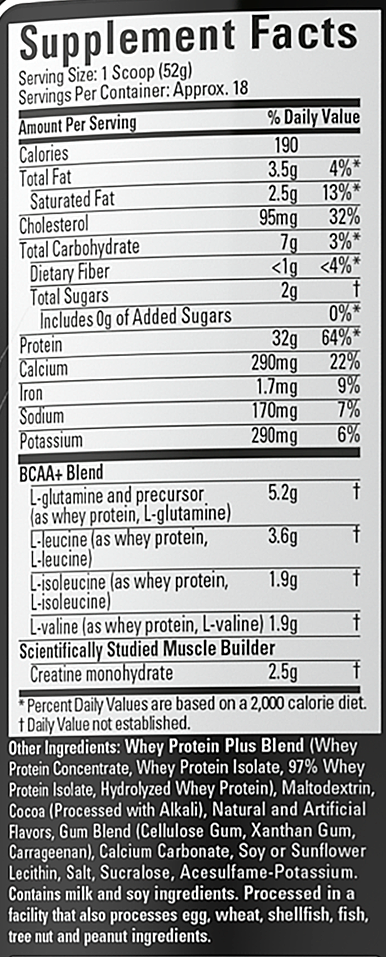
This doesn’t include the amino acid profile, which a lot of people get confused about. Since amino acids are the building blocks of protein, every protein powder contains them. Having an amino acid profile listed is totally fine. But, you do want to look specifically at the ingredient list which is usually underneath the supplement facts.
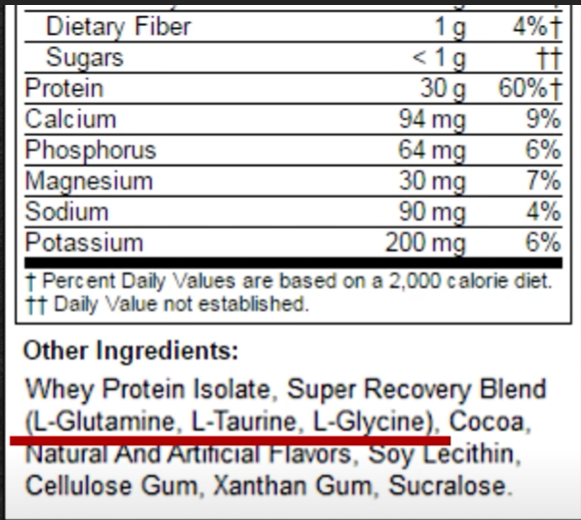
What you want to see is simply the type of protein being used as the first ingredient, and then whatever additional flavors, sweeteners, and binding agents are being used after that. What you don’t want to see in this list are singular amino acids.
When it comes to amino spiking, you might see l-glutamine , l-taurine, or l-glycine listed. Branched chain amino acids (BCAAS) are sometimes used because they’re actually cheaper gram for gram than other protein (i.e. whey concentrate and isolate).
I’ve covered which amino acid supplements are worth your time in another article, in case you’re interested.
Creatine Spiking
This might surprise you because it’s something most people are totally unaware of. Oftentimes, people will see creatine listed on their protein powder and think, “Oh this is great, what an awesome product! I’m getting 25 grams of protein per scoop and my 5 grams of daily creatine as well. This is an excellent company that truly cares about creating premium, quality products!”
This unfortunately isn’t the case. Actually, you just got played.
In reality, creatine is actually a combination of 3 amino acids: methionine, arginine, and glycine. Even though creatine is not protein, it’s still a nitrogen containing compound. Thus, it will register as protein when the powder containing it gets tested.
Not only that, but some tests have shown that creatine can register as high as 140% protein. So if the powder has 5 grams of creatine in it, that could be accounting for up to 7 or 8 grams of the protein total. Companies will do this because, gram-for-gram, creatine is a lot cheaper compared to protein.
The same thing also applies to other nitrogenous compounds, such as beta alanine or betaine anhydrous.
So, unless the company specifically states that the protein total is separate from these other ingredients, there’s a good chance they’re using them to inflate the protein total.
Does it really make that much of a difference?
Now, whether or not amino spiking is actually going to affect your bottom line muscle growth will vary from product to product. It really just depends on how heavily the powder is spiked.
If a company is just using a few extra grams of amino acids to shave off a tiny bit of cost per tub, then it’s probably not going to matter in a practical sense.
But in any case, it’s just a flat out misleading tactic. You have no way of knowing how heavily spiked a given powder actually is. Consequently, there’s no good reason to give your money to supplement companies that are intentionally B.S.ing you.
Protein Powder Scam #2: False Claims
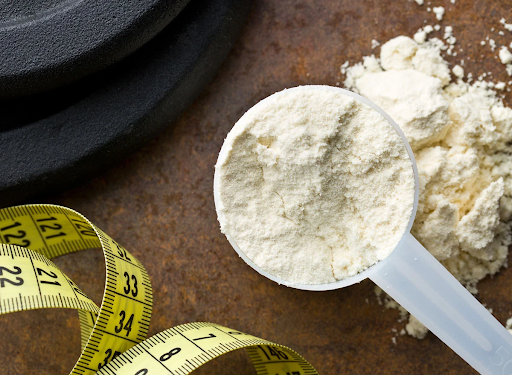
Some supplement companies try to portray their protein powder as some kind of high tech, magical, muscle-building potion that’s going to skyrocket your results in comparison to other good quality protein sources, whether that’s regular solid food protein or a different type of protein powder.
Now yes, on a gram for gram basis, protein powders (when formulated properly) are very high quality sources of protein. These include whey protein, casein, egg white protein, and even plant based powders. Each has a high bioavailability and a strong amino acid profile, and those are all good things.
But, also keep in mind that as long as you’re consuming enough total protein for the entire day, (around 0.8 grams per pound of body weight or 1.8 grams per kilogram) you’ll have gotten all the amino acids you need to optimize muscle recovery and growth. If your meals are generally based around some kind of complete protein source—chicken, fish, steak, etc.—then protein quality isn’t something you need to obsess over.
When it all comes down to it, protein powders are optional. You don’t have to use them.
You don’t have to consume a liquid protein shake pre workout, or post workout, or before bed. There’s no special benefit there, and I even say this as someone who owns a supplement line and has a protein powder in development.
In reality, protein powder isn’t even a supplement. It’s a lot more accurate to just think of it as a convenient food product. Whether it’s whey, or casein, or egg, or pea protein, these powders are derived from food sources. They literally are food.
Don’t fall for the over-hyped marketing when these companies are literally selling you food.
If you enjoy the taste and/or convenience of a protein powder, and you find that it helps you hit your daily protein needs more easily, then go for it.
I’ve consumed whey protein on a daily basis for over 20 years now. Personally I find it works great in protein shakes or smoothies, homemade protein bars, and even for high protein coffee.
But, if you’d rather just get all your protein from regular solid food sources, that’s fine too. Let me know in the comments what your personal preference is. I’d be genuinely curious to know how many of you are using a protein powder versus not.
Protein Powder Scam #3: Proprietary Blends
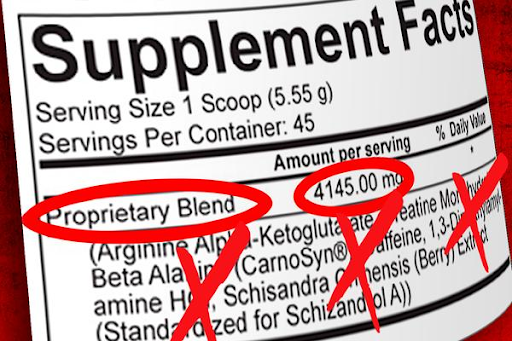
Now, this one isn’t necessarily a straight up filthy “scam.” However, it is something you should be aware of because it’s something a lot of supplement companies take advantage of on purpose, and it can be misleading. I honestly don’t understand how this is so prevalent.
Using proprietary blends when listing out the protein sources in the product is something that almost every protein powder blend on the market does.
In other words, if you look at protein powders that include more than one type of protein, the label virtually never tells you how much of each protein source you’re getting.
Instead, the company will just list the total grams of protein. Then, they’ll list of the different types of protein that are in there, but not the specific amounts.
The most common example: let’s say you’re buying a powder that uses a blend of whey concentrate and whey isolate. Almost never will the product state how much whey concentrate and how much whey isolate you’re specifically getting. Instead, it’ll usually just be listed like this:

Always keep in mind that the most prominent ingredient has to be listed first. For all you know, this could very well be 95% whey concentrate and 5% whey isolate.
Or, if you’re buying a blend of milk protein, whey isolate, and egg white protein, and it’s using a proprietary blend, again, it could literally be 98% milk protein, 1% whey isolate, and 1% egg white protein. You just have no way of knowing.
Now how much does this actually matter in a practical sense?
If you’re already using a certain protein blend and you’re happy with the macros, the taste, and the price, then ultimately that’s fine. It’s not going to affect your actual muscle building results.
Like I said before, the exact type of protein you use doesn’t really matter as long as it’s a high quality, complete source. However, if you’re in the market for a new protein powder, then it is something to take into account.
For example, let’s say you were looking for a whey concentrate/whey isolate blend. You then find two different products to choose from: one lists whey concentrate first on the label, and the other has whey isolate first. If the price is comparable, you’d probably want to go with the one that lists whey isolate first.


There’s nothing inherently wrong with whey concentrate. But, it does tend to be a bit heavier on the stomach, and it doesn’t mix quite as well. It has a stronger “protein” taste, so be aware before you buy it.
By going with the one that lists whey isolate first, you at least know that more than half of that blend is whey isolate. The other product, however, could be almost all whey concentrate with just a tiny bit of isolate sprinkled in.
The direct practical aspect aside, in my view this just comes down to basic transparency in labeling. I think you should know exactly what is in the supplements you buy.
Most of us don’t accept pre-workouts that use proprietary blends because we want to know how much of each ingredient we’re getting. While that’s not directly comparable to protein powders, it is the same general idea. If companies are selling protein blends, then they should list off how much of each protein source is included.
Accurate, No B.S. Protein Labeling
As I mentioned earlier, at my supplement line RealScience Athletics, we do have a protein powder in development.
With that product, I guarantee you will definitely know exactly what you’re getting in terms of the exact protein source.
If you want to check out the rest of what we offer in research backed, properly dosed supplements you can trust unlike most of the B.S out there nowadays, then visit realscienceathletics.com and use code youtube15 to take off 15% from your first order.
In Conclusion:
Don’t be fooled by supplement companies trying to short change you. In particular, look out for these 3 common protein powders scams before you fork over your hard earned cash.
- Amino Spiking
- False Claims
- Proprietary Blends
Now that you have some general knowledge about some of the shady practices that go on in the industry, you should be better prepared to pick the best protein powder for you.
If you found this article helpful, make sure to sign up for your FREE custom fitness plan below...




